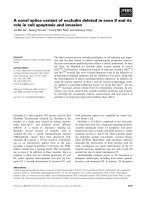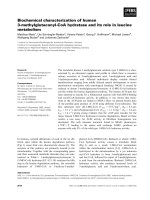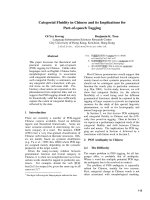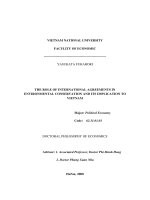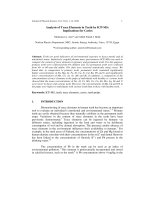THE PERSPECTIVE OF HUMAN MORALITY IN BUDDHIST THOUGHTS AND ITS IMPLICATIONS FOR THE CURRENT VIETNAMESE EDUCATION - Full 10 điểm
Bạn đang xem bản rút gọn của tài liệu. Xem và tải ngay bản đầy đủ của tài liệu tại đây (558.77 KB, 80 trang )
THE PERSPECTIVE OF HUMAN MORALITY
IN BUDDHIST THOUGHTS AND ITS
IMPLICATIONS FOR THE CURRENT
VIETNAMESE EDUCATION
By
Huu Trieu Em Nguyen
Supervised by
Prof. Salvatore Fava PhD
A DISSERTATION
Presented to the Department of Arts & Humanities
Program at Selinus University
Faculty of Arts & Humanities
in fulfillment of the requirements
for the degree of Doctor of Philosophy
in Philosophy & Critical Thinking
2020
1
DECLARATION
I do hereby attest that I am the sole author of this thesis and that its
contents are only the result of the readings and research I have done.
Student’s signature
Nguyen Huu Trieu Em
2
ACKNOWLEDGEMENT
The first word I would like to sincerely thank Selinus University and
the teacher who directed me to implement the topic. He has been dedicated to
helping me navigate research, gain knowledge, give me valuable advice and
suggestions so that I can complete my research.
I would like to thank the faculty of the Faculty Arts & Humanities, the
experienced and enthusiastic lecturers of the school for providing, imparting
knowledge, practical experience and useful scientific methods throughout the
time study at school.
Besides, I would like to thank my close friends in the class for sharing,
wholeheartedly helping, encouraging me during the past time.
I also thank my friends and colleagues for directly and indirectly
assisting me in participating in group discussion research, helping to answer
and collecting survey questionnaires for this thesis. Your contribution is
important to the success of your research.
Finally, my deep gratitude to my Parents and family members who have
always encouraged and supported me to complete my thesis.
3
ABSTRACT
The education of Buddhism is very rich in humanity, because it helps
people to have true faith, determination to practice the Dharma to become
perfect people, people with a noble life, with two qualities. Highlights are
compassion and wisdom.
In line with the direction of educational development in the new era, the
United Nations Commission on Science, Education and Culture (UNESCO)
has initiated the purpose of learning: "Learning to know, learning to do, and
learning to live together", learn to assert yourself. "In a nutshell, it is:
Learning to develop comprehensively, intellectually, skillfully, morally and
lifestyle.
Today, while people are making great strides along the path of
development towards a knowledge society and an open society, there are
many "great risks" for the whole society, in which moral degradation, lifestyle
is becoming a global problem, sadly it happens most often in the younger
generation, students, students - the future owners of society. And Vietnam is
one of the countries that need to raise an alarm about morality and lifestyle.
Facing the country's sustainable development requirements, Vietnam needs to
build a new ethical foundation, consistent with the era on the basis of
inheriting the good traditional moral values of the nation.
After about 20 centuries of existence and development with the nation,
Buddhism has left a profound impact in the history, culture and society. With
the philosophy of compassion, rejection, and encouragement of the people
towards goodness, Buddhism has easily entered the hearts of people, has the
4
effect of perfecting the moral personality, directing people to a life of
altruism, equality and charity. The fact has proved that Buddhism conforms to
the morality and lifestyle of Vietnamese people, and it has made positive
contributions to the cause of national construction and defense. Today, in a
complex cultural, economic and political context, we need to strongly
promote the positive values of this religion in order to contribute to building
the moral foundation of Vietnamese people in general and student generation
in particular. Young people play an important role in the nation's construction
and development in each country because it is a guaranteeing force for
sustainable development. When he was still a student, during a talk with
students, President Ho Chi Minh asserted that "Talented without virtue is
useless, having virtue without talent is difficult to do."
However, an alarming fact is that the moral lifestyle of a part of
students is going down for many reasons, including both subjective and
objective causes. But if we continue to find solutions to prevent the effects of
being objective and not strict with ourselves, the problem cannot be solved.
Therefore, this article will generalize the ethical situation of students, analyze
two causes that are considered basic, and propose a few solutions drawn from
practical observation results and from studies in both domestic and
international.
Key words: Human morality, Buddhist thoughts, Vietnamese education.
TABLE OF CONTENTS
5
ABSTRACT
DECLARATION ............................................................................................. 2
ACKNOWLEDGEMENT .............................................................................. 3
ABSTRACT ..................................................................................................... 4
CHAPTER 1: INTRODUCTION................................................................ 10
1.1. Background of the study..........................................................................12
1.2. Rationale of the study..............................................................................14
1.3. Objectives of the study............................................................................17
1.4. Scope of the study...................................................................................17
1.5. Significance of the study.........................................................................19
1.6. Theoretical and practical meanings of the thesis......................................20
1.6.1. Theoretical meaning......................................................................20
1.6.2. Practical significance.....................................................................21
1.7. Structure of the study................................................................................21
CHAPTER 2: LITERATURE REVIEW....................................................23
2.1. Philosophical commentary on ethics........................................................23
2.2. Buddhist thought about morality and lifestyle.........................................28
2.2.1. The Buddhist thought of compassion and joy leads people to build
a pure and healthy life, a true direction of goodness.......................................28
6
2.2.2. In the relationship between people, Buddhist thought always aims
to build relationships of equality, moderation and mutual respect..................33
2.2.3. In the relationship between people and nature, Buddhist thought
directs people to respect and build sustainable environments.........................36
2.3. Role of The perspective of human morality in Buddhist thoughts in
Vietnamese education......................................................................................38
2.3.1. Overview of the ethical status and lifestyle of Vietnamese
students - students today..................................................................................38
2.3.2. Some features of the profound influence of Buddhism on the
lives of Vietnamese people..............................................................................39
2.3.3. Buddhism is an educational system.............................................44
2.4. Previous research......................................................................................46
2.4.1. Foreign researches.......................................................................46
2.4.2. National researches......................................................................47
CHAPTER 3: INFLUENCE LEVEL OF BUDDHIST THOUGHT AND
MORAL STATUS OF VIETNAMESE STUDENTS.................................48
3.1. The influence of Buddhist thought on the thinking of Vietnamese people
3.1.1. The reasonable values of Buddhist thought in our country.........48
3.1.1.1. The integration of the spirit of compassion, joy and
rejection with the patriotism of Vietnam ........................................................48
7
3.1.1.2 The influence of Buddhist morality in relations of conduct
and communication......................................................................................... 49
3.1.1.3 The influence of Buddhist morality in fairness and
equality................................................................................................. 50
3.1.1.4 The influence of Buddhist morality on honesty..............50
3.1.1.5 Influence in goodness, gratitude and love ...................... 51
3.1.1.6 Influence in the vast tolerance ....................................... 51
3.1.1.7 Influence in the spirit of self-reliance and autonomy of
each person............................................................................................ 51
3.1.2. The limitations ............................................................................ 52
3.2. The current status of ethics and lifestyle of Vietnamese students –
students ........................................................................................................... 53
3.3. Reason ...................................................................................................... 59
3.3.1. Families lack the right to care for or educate their children ....... 59
3.3.2. Ethical education at school has not really been effective, and has
not yet achieved the goal of educating people towards the good. .................. 61
3.4. Current solution to educate Buddhist ethics education method for students
......................................................................................................................... 62
CHAPTER 4: CONCLUSION..................................................................... 65
4.1. Conclusion................................................................................................ 65
8
4.2. Recommendation...................................................................................... 71
4.3. Limitations and Suggestions for further studies ...................................... 74
REFERENCES .............................................................................................. 75
9
CHAPTER 1: INTRODUCTION
Vietnam is a country located at the crossroads of international
circulation in Southeast Asia, and is the destination of the merchants of the
Mediterranean region. From such an advantageous geographical position, the
countries in this region have established economic, commercial, cultural and
religious relations... through the two pepper roads, ie the sea crossing. Sri
Lanka, Indonesia, China, Vietnam and Dong Co roads, which are roads,
originate from Northeast Asia and cross Central Asia, Mongolia, Tibet,
Vietnam and China. Therefore, the major religions, including Buddhism, have
many advantages to enter our country.
As soon as it was introduced, from the first century, Buddhism quickly
adapted to the river way of the Vietnamese people and in the process of
formation and development in this country, Buddhism did not encounter any
obstacle in integration into all strata of Vietnamese society. Buddhism
permeated the Vietnamese civilization naturally and easily as water permeates
the soil. Buddhism has spread throughout the cave along the alley in Vietnam
and has a certain foothold from the court to the Vietnamese village. The
morality of Vietnamese Buddhism has also been ingrained in the lifestyle and
thinking of the Vietnamese people and has become invaluable spiritual values
for people in this country. Throughout the history of the eighteenth century,
Buddhism has proved its existence in almost all fields of politics, economy,
culture, society... and has contributed, influential influences pole on the
aforementioned sides.
In line with the direction of educational development in the new era, the
United Nations Commission on Science, Education and Culture (UNESCO)
10
has initiated the purpose of learning: "Learning to know, learning to do,
learning to live together”, learn to assert yourself. "In a nutshell, it is:
Learning to develop comprehensively, intellectually, skillfully, morally and
lifestyle.
Today, while people are making great strides along the path of
development towards a knowledge society and an open society, there are
many "great risks" for the whole society, in which moral degradation ,
lifestyle is becoming a global problem, sadly it happens most often in the
younger generation, students, students - the future owners of society. And
Vietnam is one of the countries that need to raise an alarm about morality and
lifestyle. Facing the country's sustainable development requirements, Vietnam
needs to build a new ethical foundation, consistent with the era on the basis of
inheriting the good traditional moral values of the nation.
After about 20 centuries of existence and development with the nation,
Buddhism has left a profound impact in the history, culture and society. With
the philosophy of compassion, rejection, and encouragement of the people
towards goodness, Buddhism has easily entered the hearts of people, has the
effect of perfecting the moral personality, directing people to a life of
altruism, equality and charity. The fact has proved that Buddhism conforms to
the morality and lifestyle of Vietnamese people, and it has made positive
contributions to the cause of national construction and defense. Today, in a
complex cultural, economic and political context, we need to strongly
promote the positive values of this religion in order to contribute to building
the moral foundation of Vietnamese people in general and student-student
generation in particular.
11
1.1. Background of the study
As a form of social consciousness, Buddhism as well as all religions, also
carries in it the ideological value, as a reflection of humanity's desire to reach
the truth - good - good, but the difference is more in focusing on the goal of
freedom from suffering. The morality of religion, from the meaning of a
socially conscious form, is also the accumulation of mankind, which religions
with different positions are systematically reflecting through Cause of each
particular religion. From such a relationship, between religious morality and
social morality, there is always a common point and a difference, and in every
person there are two (dual) dualities that are both a citizen of the society and a
believer religion. There is no morality apart from people, outside society, so
the dissection or distinction between religious morality and social morality is
only relative. "The greatest values of religion are the values of morality and
culture."
Ethics is always specific history, it was born, existed and developed due
to certain human needs in relation to society and their natural world. When
social existence changes, social relationships change, morality also changes
with ethical rules and behavior standards that can sometimes be reevaluated or
redefined. But the common goal of every ethical system is to perfect human
dignity and reach to build the typical truth - good - beauty, Buddhist morality
is no exception to that general rule. Buddhist ethics is the crystallization of
ideas, ancient Indian culture, but now it has become an example of Eastern
morality in all moral values of mankind. In which there are many contents of
educating the religion to be active people in modern society today.
12
Buddhist morality is the result of a selective succession and development
of the concepts, moral categories and practices of ancient India. And
Buddhism's man-made virtues are highly self-conscious people. In particular,
as a religion based on the belief of "freeing people from suffering of
immorality", Buddhism is a religion with atheistic tendencies. Buddhism
advocates suffering because it is man who creates karma and is conditioned
into it. Therefore, liberation is one's own career by accumulating good karma
and eliminating all negative karma, not by the gift of any divine beings. So in
Buddhism, the goal of liberation is also to cultivate the human being.
In particular, Buddhism has a moral view of the progressive environment.
Buddhism is an ancient religion, it has the unique behavior of a religion
towards the environment, completely opposite to the attitude of some theistic
religions and the opposite of the spirit of following the profits of the economy
and consumer economy in the natural environment. From the Buddhist point
of view, the modern treatment of industry and consumption towards the
environment is to follow only the profit and satisfy the relentless demand for
enjoyment which Buddhism considers to be the encouragement of greed and
hatred and when dominated by them should cause heavy karma.
Environmental crises, environmental exhaustion and ecological imbalances
can only be corrected by the mindfulness to overcome that "three poison".
Buddhism is also one of the earliest religions to set the standard of being
human associated with the quality of being environmentally friendly.
Buddhism has laid down a number of rules about attitudes toward nature in
the broad sense. It can be said that although the term "Environment" or
"environmental ethics" are not included in the Buddhist teaching, the Buddhist
13
solutions to nature are very suitable to the current environmental ethics
concept such as in the Seoul Declaration on Environmental Ethics 1997.
Therefore, it can be said that Buddhism does not precede the term
"environmental ethics" but has gone ahead with the content of environmental
ethics, and today we can refer to and learn from that positive suggestions.
Therefore, the author has launched the topic "Perspectives on human morality
in Buddhist thought and its implications for Vietnamese education today" to
conduct research, analysis, and impact assessment.
1.2. Rationale of the study
Buddhism is a form of philosophy, religion and morality born in India
in the 6th century BC, which was introduced into Vietnam around the
beginning of Christ. When entering Vietnam, Buddhism was quickly
“Vietnam” to suit the conditions of Vietnamese history, Vietnamese culture
and beliefs, with a long life and profound influence on the spiritual life.
Vietnamese people in history as well as present. Right from the time of its
introduction into Vietnam, with the doctrinal ideas close to the beliefs,
customs, traditions of the nation, Buddhism quickly integrated with
Vietnamese culture. In our country, Buddhism and the national ideology have
a close relationship with each other, initially this relationship was a two-way
relationship: If Buddhism affects the process of forming Vietnamese people's
thoughts then the customs and traditions of the nation also affect Buddhism to
create a separate line of Buddhism imbued with the national cultural identity
of Vietnam. Today, Buddhism is still an integral part of the spiritual life of
Vietnamese people. Many Vietnamese people do not follow Buddhism but
still voluntarily follow the principles and standards of Buddhist ethics as one
14
of their motto. Since the last years of the twentieth century, our country has
been increasingly affected by strong market economy, industrialization,
modernization and international integration. Besides the proud achievements
in all aspects of social life, there is an undeniable fact that the imbalance in
human-social development process in the current period, especially is the
moral degradation of a part of young people. Current situation of young ethics
has many issues that need to be addressed. In addition to the young people
with good moral qualities, a sense of learning and labor, and a great
contribution to the nation, a significant number of young people are showing
signs of decline in moral character, many manifestations of depraved lifestyle
contrary to the fine traditions and customs of the nation. The attitude of
disregarding traditional values is the cause of increasing social evils among
young people and young people. They tend to promote individuality,
selfishness, coldness, no gratitude, little attention to obligations and
responsibilities, little attention to those around them... A series of
heartbreaking phenomena takes place in The place of school and in society
that we cannot ignore. On the other hand, in the context of today's
globalization, the morality we are building needs to be towards a system of
spiritual values in which the tradition and the modern need to be closely
interconnected. closely so that national culture in general and traditional moral
values in particular participate in the integration with common values of all
humanity without dissolution, without losing the good cultural identity of the
nation. Young people are the pillars of the country, the future owners of the
country, the abundant labor force of the whole nation. Strong or weak home
country is caused by young people. Ethical education for young people today
has become an urgent issue to train a generation with intellect, physical
15
strength, spiritual and moral life in a pure, brave and truly meaningful way
civic awareness and responsibility, contributing effectively to the cause of
national construction. A good implementation of this process requires a
variety of measures and different actors. Besides the educational work of
schools, social organizations, the law, Buddhist ethics will be an important
factor contributing to the adjustment of morality and lifestyle for young
people if we know how to promote its positive values. As an element of
national cultural identity, Buddhist ethics have interfered, merged, enriched
traditional Vietnamese morality. The spirit of compassion, the good direction
of Buddhism is one of the origins of humanism, equality, and peace of
Buddhism in accordance with the current trend of integration and
development of different ethnic groups in the world. Therefore, inheriting,
promoting and having specific methods to convey the values, principles,
ethical standards of Buddhism to young people, surely Buddhism will make
effective contributions to the Ethical education program for young people in
Vietnam today.
On the basis of scientific research and objective evaluation, our Party has
repeatedly emphasized: Beliefs and religions are the needs and spiritual
interests of a part of the people, they still exist for a long time and dominate
the cultural and spiritual life of a part of the people, including moral values
suitable to the interests of the entire people and the construction of a new
society. Exploiting the positive elements of Buddhist ethics and limiting its
negative effects to build morality for young people today is essential.
Stemming from that reasoning and practical requirement, the author chooses
the topic "The perspective of human morality in Buddhist thoughts and its
implications for the current Vietnamese education.”
16
1.3. Objectives of the study
The thesis focuses on clarifying some basic contents of Buddhist ethics
and the influence of Buddhist ethics on the current education of Vietnam, on
which basis to make some recommendations to promote images positively and
limit the negative effects of Buddhist ethics in the process of building and
perfecting morality for students.
To accomplish the above objectives, the study performs the following
objectives:
1. Presenting the basic contents of Buddhist ethics and the introduction of
Buddhism into Vietnam
2. Analyzing of the main effects of Buddhist morality on Vietnamese
students
3. Analyzing the moral significance of people in Buddhist thought for the
current Vietnamese education
4. Providing some recommendations to promote the positive effects and
limit the negative effects of Buddhist morality in the process of building and
perfecting morality for students through education.
1.4. Scope of the study
The object of the thesis is Buddhist ethics and its effects on the
Vietnamese youth ethics today.
Buddhist ethics covers a very broad content, but within the scope of his
doctoral thesis, the author focuses on clarifying some of the most basic and
17
specific ethical values, principles, and characteristics of Buddhism. At the
same time, these are also the contents in the Buddhist teachings that have the
most profound influence on the morality of Vietnamese people in general and
Vietnamese youth in particular. In terms of time, the thesis examines the
influence of Buddhist ethics on student morality in Vietnam through
Vietnamese education from 2000 to the present.
The thesis is based on the methodology of Marxism-Leninism,
combining dialectical materialism and historical materialism, Ho Chi Minh
thought, and the viewpoint of our Party and State on religion in general and
Buddhism in particular, especially the viewpoints on renewing religious
awareness and policies towards the religion of our Party and State since the
country's change. The thesis uses the main research methods of philosophy
such as: Methods of analysis, synthesis, generalization, statistics, data
collection, comparison, comparison to draw conclusions, and scientific
judgment.
Regarding time: The research topic on the influence of the Buddhist
worldview, especially the views on human morality, on the spiritual life of
Vietnamese students from 2000 to the present.
In terms of space: The thesis conducts research on the influence of the
Buddhist worldview, especially the viewpoint on human morality on the
spiritual life of Vietnamese students today.
Regarding the content of the research: The thesis studies the Buddhist
worldview in a holistic system of conceptions about the world, the position
and role of people in the world. Within the scope of this thesis, the author only
18
studies human moral viewpoints within the scope of thought, morality,
lifestyle, because the ideological life plays a major, dominant, regulated role
in calculating substance, content and direction of development in human
mental activities.
1.5. Significance of the study
Education for children, especially for disadvantaged children, has a
direct impact on the overall development of society not only because children
are the future human resources of the country, but also for their parents. I am
also a direct human resource producing material wealth for society. On the
other hand, the intelligence and social behavior of a child is inherently formed
during the first years of life and during school. Therefore, the right
pedagogical effects for this age group will help children develop
comprehensively and in the right direction, which is the foundation for
development throughout the later stages. Realizing the importance of social
education will partly offset the limitations of family and school education,
while providing equal development opportunities for all children and religious
return to the orphans, the missing, the physically and mentally deprived.
The reception, management, nurturing and education of disadvantaged
children are the path of reincarnation, or in other words, social education is an
important goal of Buddhist education. From the Middle Ages, Vietnamese
Buddhist history proves that, under the protection of the temple, Ly Cong Uan
from a small child had the opportunity to come to the mat to move the capital
and give birth to a brilliant dynasty. In addition, the Buddhist education also
contributes to the nation of the learned masters, with the classic responses to
the history books, making your country's envoy admire.
19
In the Buddhist education environment, children are not only cared for
physically but also educated under the formal education program, practicing
social morality, approaching the spirit of "compassionate and compassionate,
selflessness” by specific lessons, by specific methods derived from body -
speech - mind. Supporting disadvantaged children is a sustainable and long-
term way to implement the educational socialization policy, while public
educational institutions have not met the social needs and a part of children. I
want to steal books to go to school but I cannot afford it.
Education for children to understand is not as difficult as education for
children to do. In order to create an effective educational environment,
Buddhist educational institutions not only ensure the quality of programs,
material conditions, equipment, etc., but also the teachers and lecturers have
to turn themselves into "panels." mirrors ”for children to follow. It is the
honest, kind lifestyle of those around him that makes an important
contribution to teaching children to be good people. In each charity center,
according to the routine weekly, monthly or quarterly, the teachers, monks
and nuns should organize group activities with the spirit of "spreading
hearts". This helps them recount their own experiences, interact with teachers,
collaborate with friends. Such moments will help children feel the family
atmosphere, express their role, eliminate the inferiority complex about the
situation.
1.6. Theoretical and practical meanings of the thesis
1.6.1. Theoretical meaning
20
